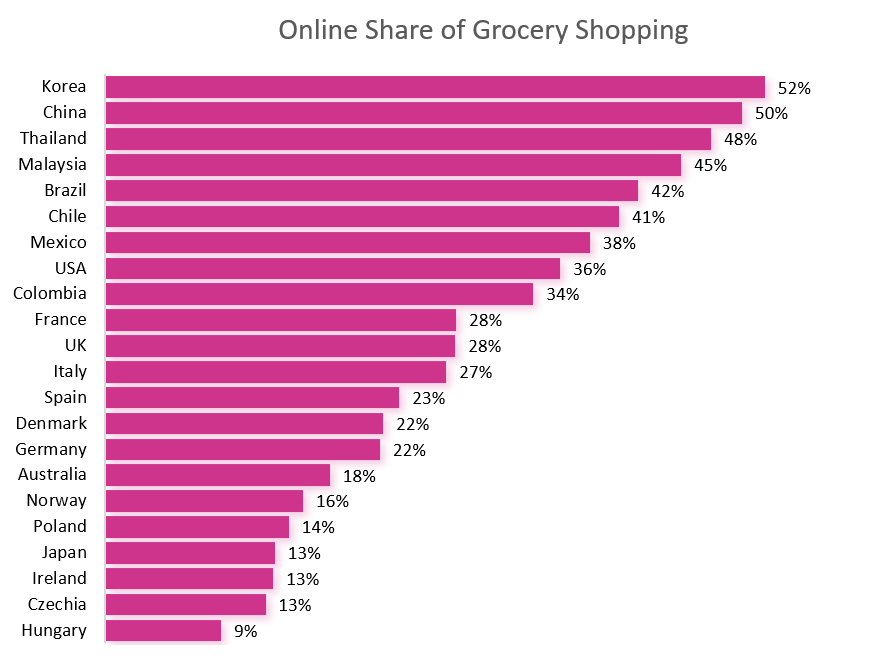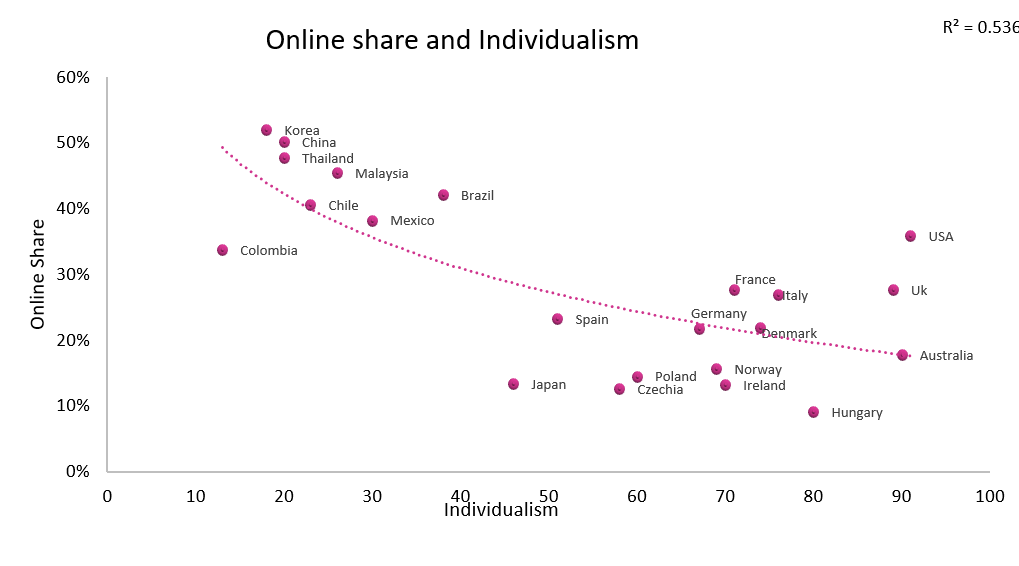Another why behind the buy: culture’s influence on online grocery shopping
Another why behind the buy: culture’s influence on online grocery shopping
Throughout the pandemic, dunnhumby has released a series of studies known as the Consumer Pulse. First released in March 2020, the Pulse has attempted to keep track of changing shopper behaviours in the wake of Covid-19. You can read more about the Pulse and what we’ve learned in our most recent blog post on the topic, Covid-19 one year on.
Over the past 18 months, the Pulse has explored issues ranging from the Retail response to the pandemic through to shopper attitudes towards the state of their local economy. One major trend we’ve seen reflected in the studies is the rapid rise in grocery ecommerce. Many countries have seen significant growth in the share of shopping trips conducted online during the pandemic, a natural by-product of consumers trying to limit their exposure to risk.
In spite of that growth, adoption of online grocery remains extremely inconsistent from country to country. While more than half of all shopping trips are made online in certain territories, in others that figure sits at less than one in 10[1]. Online may be on the rise, but it’s not ubiquitous yet.
When we look at online adoption reported in our surveys in more detail, one thing in particular leaps out. Of the five countries that lead the way in terms of online grocery, four of them – Korea, China, Thailand, and Malaysia – are from Asia. South American countries – Brazil, Chile, Mexico, and Colombia – follow closely behind.
With such a stark difference in online share made in these territories compared to those in other nations, particularly European countries, this begs the question: what role, if any, does culture play in influencing how we choose to shop?

Figure 1: Online share of grocery shopping; dunnhumby Consumer Pulse (Feb 2021)
Comparing world cultures
In a blog post published late last year, we put forward the idea that cross-cultural psychology may play a role in private brand success. I think that we can draw a similar link with online share, as well. Before we do so, however, it’s important to explain the rationale behind some of the assertions we need to make about the psychologies of different cultures in support of that connection.
One of the key concepts in cross-cultural psychology is that of individualism[2]. Individualistic cultures tend to focus more on personal goals and definitions, and people who embrace this way of thinking focus more on themselves as a unique person than as part of a wider whole. Individualism is, very obviously, the opposite of collectivism. Collectivist societies gravitate more towards group goals, and the sense of solidarity that comes from belonging to a bigger social unit.
Naturally, individualists and collectivists tend to demonstrate different behavioural traits. If you were to ask a person from an individualistic culture “who are you?”, they’re more likely to look at themselves in detail (e.g. “I’m a data scientist”, or “I’m passionate about…”). The same question in a collectivist culture is more likely to generate a more general response (e.g. “I’m Maya’s mum”, “I’m a member of…”)[3], [4]. In other words, individualist cultures, tend to think analytically, whereas collectivist cultures tend to think more holistically[5], [6].
So what does this have to do with the prevalence of online shopping? Well, the first link that we can draw between the two is geographical.
Professor Geert Hofstede was one of the world’s leading scientists in the field of cross- cultural psychology. Hofstede’s 2010 book Cultures and Organizations: Software of the Mind builds on decades of research and scores 76 countries on six different traits that help to define their national identity. Included in those six, as you might expect, is individualism vs. collectivism.
Below we can begin to see a clear correlation between online grocery share and individualistic culture[7]. On average, the less individualistic a country tends to be, the more likely its citizens are to shop online.

Figure 2: shows a negative logarithmic correlation between online share and individualism. Sources: dunnhumby Consumer Pulse and Hofstede Insights
Connecting culture and ecommerce
Individualist and collectivist cultures don’t just define national identity; they can also influence our thinking. While collectivist cultures prefer to see the “whole picture” for instance, cultures that value individualism are more likely to break ideas and concepts down into individual parts[8], [9], [10]. Some cultures prefer to see the entire forest, whereas others prefer to see individual trees, speaking to a fundamental difference in the way that we think.
For grocery, the best way to see the whole picture is online. When you’re in a physical store, reaching for a product in an aisle, it’s impossible to look beyond that point – you can’t see the rest of the store, which makes it impossible to see the whole picture. That’s not the case with online, which allows shoppers not just to “see” the forest but skip around it at the click of a button as well.
Other factors are almost certainly playing a role here, too. Collectivist – more holistic – cultures prefer to process more information in service of building a bigger and more complete picture[11]. Again, this can be done more efficiently online than at a store. Similarly, this holistic approach means that collectivists may see online as a natural extension of the physical store which increases trust, something that individualistic cultures may be less likely to do.
The more that we look at the deep behavioural traits of individualist and collectivist cultures, the more reasons we can find for online to have taken off to such an extent in the latter.
Can we attribute online grocery’s popularity in Asian and South American territories solely to culture? Clearly not, as can be seen with the variance for some countries. Commercial reasons such as Internet speeds, delivery network infrastructure[12], affluence[13], and a range of technological and regulatory advancements[14] all have roles to play too. Other behavioural science reasons are also at play (e.g. how future facing a culture is and the role of habit formation).
What we can assert though is that cross-cultural psychology should at least be part of our understanding about the geographical success of online grocery. Like any other data that we use to interpret behaviours, national cultures can provide valuable context as part of a wider mix of insights.
[1] dunnhumby Consumer Pulse (Feb 2021)
[2] de Mooij, M. and Hofstede, G. (2002). Convergence and divergence in consumer behavior: Implications for international retailing. Journal of Retailing 78, 61–69
[3] Ma, V. & Schoeneman, T.J. (1997). Individualism versus collectivism: A comparison of Kenyan and American self-concepts. Basic and Applied Social Psychology, 19, 261–273
[4] Henrich, J. (2020). The Weirdest people in the world. Allen Lane
[5] Masuda, T. and Nisbett, R.E. (2001). Attending Holistically Versus Analytically : Comparing the Context Sensitivity of Japanese and Americans. Journal of Personality and Social Psychology, Volume 81 (5), p 922–934
[6] Choi, Incheol, Minkyung Koo, and Jong A. Choi (2007), Individual Differences in Analytic versus Holistic. Thinking. Personality and Social Psychology Bulletin, 33 (5), 691–705
[7] https://www.hofstede-insights.com/product/compare-countries/
[8] Henrich, J. (2020). The Weirdest people in the world. Allen Lane
[9] Masuda, T. and Nisbett, R.E. (2001). Attending Holistically Versus Analytically : Comparing the Context Sensitivity of Japanese and Americans. Journal of Personality and Social Psychology, Volume 81 (5), p 922–934
[10] Choi, Incheol, Minkyung Koo, and Jong A. Choi (2007), Individual Differences in Analytic versus Holistic. Thinking. Personality and Social Psychology Bulletin, 33 (5), 691–705
[11] Li, L. M. W., Masuda, T., & Russell, M. J. (2015). Culture and decision making: Investigating cultural variation in the East Asian and North American online decision-making process. Asian Journal of Social Psychology, 18(3): 183–191
[12] https://hbr.org/2013/12/why-china-loves-the-internet
[13] https://www.campaignasia.com/article/why-china-is-a-decade-ahead-in-social-driven-sales/465916
[14] https://www-economist-com.proxy.library.uu.nl/leaders/2021/01/02/why-retailers-everywhere-should-look-to-china
RELATED PRODUCTS
The latest insights from our experts around the world
Understanding evolving customer needs in the age of AI and data abundance


